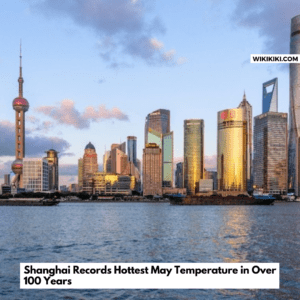Shanghai experienced its hottest May day in over 100 years on Monday, with temperatures reaching 36.1 degrees Celsius (97 degrees Fahrenheit). This surpassed the previous record of 35.7 degrees Celsius (96.3 degrees Fahrenheit) set in May 1876 and matched in 1903, 1915, and 2018. The record-breaking heat wave occurred in the Xuhui district of Shanghai. The Shanghai Meteorological Department issued its first high-temperature alert of the year as temperatures exceeded 35 degrees Celsius (95 degrees Fahrenheit) for three consecutive days.
Shanghai had already recorded 50 days with temperatures over 35 degrees Celsius in 2022. The heat wave in Shanghai is part of a broader trend of rising temperatures and extreme weather events worldwide, attributed to global warming caused by human activities. It highlights the urgent need for climate action and measures to mitigate the effects of climate change.
Also Read: Wildfire Forces 16,000 People Evacuate in Halifax, Canada

The Chinese city of Shanghai recently experienced its hottest May day in more than a century. With temperatures soaring to 36.1 degrees Celsius (97 degrees Fahrenheit), surpassing the previous record of 35.7 degrees Celsius (96.3 degrees Fahrenheit) set back in May 1876, this heatwave has raised alarms about the escalating impacts of climate change. The record-breaking heat, accompanied by a series of extreme weather events worldwide, serves as a stark reminder of the urgent need for global action to mitigate and adapt to the effects of climate change.
Heatwave in Shanghai
Shanghai, one of China’s most developed and prosperous cities, has been grappling with scorching temperatures and a prolonged heatwave. The heatwave peaked on Monday, breaking a century-old record for May temperatures. The previous record, set in 1876, had been matched only three times since then, in 1903, 1915, and 2018. The unprecedented heat was recorded in Shanghai’s Xuhui district, prompting the local meteorological department to issue a high-temperature alert.
Also Read: The Impact of Rising Ocean Temperatures on Marine Life
The impact of the heatwave on daily life in Shanghai has been significant. Schools had to be closed, businesses adjusted their operating hours, and residents were advised to stay indoors and stay hydrated. A resident interviewed by AFP expressed concern about the increasing temperatures, stating, “Summers are becoming much hotter every year. I’m turning on the air conditioning sooner than before.” This sentiment reflects the growing realization among people worldwide that climate change is causing a shift in weather patterns and intensifying extreme events.
Global Warming
The heatwave in Shanghai is not an isolated event but part of a broader trend of rising temperatures and extreme weather events occurring worldwide. Across Asia, countries like India, Bangladesh, and Thailand have also experienced deadly heatwaves and record-breaking temperatures in recent weeks. The scorching temperatures have had severe consequences, including heat-related deaths, strain on infrastructure, and disruptions to daily life.
Scientists and weather experts warn that global warming, primarily driven by human activities and the emission of greenhouse gases, is exacerbating these adverse weather events. The Intergovernmental Panel on Climate Change (IPCC) has repeatedly highlighted the link between human-induced climate change and the intensification of heatwaves, storms, floods, and other extreme weather phenomena.
Climate Action
The heatwave in Shanghai serves as a powerful reminder of the urgent need for global action to address climate change. Governments, organizations, and individuals must come together to reduce greenhouse gas emissions, transition to renewable energy sources, and implement measures to adapt to the changing climate. The Paris Agreement, signed by nearly all countries in 2015, sets a goal to limit global warming to well below 2 degrees Celsius above pre-industrial levels and strive for 1.5 degrees Celsius.
Also Read: Killer Whales Interactions with Boats off the Coast of Spain and Portugal
However, the current trajectory of emissions suggests that these targets are unlikely to be met without significant and immediate action. The United Nations has warned that the period between 2023 and 2027 is expected to be the warmest five-year period ever recorded. It is crucial for nations to step up their commitments and implement robust policies to reduce emissions, enhance resilience, and support vulnerable communities in adapting to the impacts of climate change.
Beyond mitigating climate change, it is equally important to focus on building climate resilience. This includes investing in sustainable infrastructure, developing early warning systems for extreme weather events, and promoting nature-based solutions such as reforestation and ecosystem restoration. Additionally, empowering communities and individuals to make sustainable choices and promoting climate education can contribute to a collective effort in combating climate change.
Heavy Rainfall and Flooding in Sichuan and Chongqing
While Shanghai battled scorching temperatures, parts of China faced a different climate challenge—excessive rainfall and the ensuing floods. In the northeastern province of Sichuan, heavy downpours led to the evacuation of thousands of people as a precautionary measure. The province, known for its breathtaking landscapes, has a history of experiencing extreme weather conditions. Similarly, the neighboring municipality of Chongqing issued warnings about the risk of flooding. Authorities anticipated a substantial rise in water levels in the Jialing River, a tributary of the Yangtze River, due to heavy rainfall and reservoir water releases.
In conclusion, heatwave in Shanghai, accompanied by heavy rainfall and flooding in Sichuan and Chongqing, highlights the urgent need to address climate change. These extreme weather events are not isolated incidents but part of a larger trend driven by global warming. Governments, communities, and individuals must work together to reduce greenhouse gas emissions, adapt to the effects of climate change, and build resilient societies. The path to a sustainable future requires collective action, international cooperation, and a commitment to preserving our planet for future generations.
Also Read: Popocatepetl Volcano in Mexico Spews, Threatening Millions